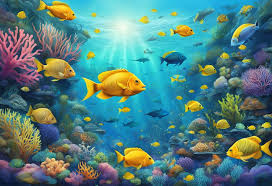Last Updated on June 5, 2024 by Dog Lover
Your Gateway to Aquatic Serenity: Embrace the Wonders of Tropical Fish
Understanding Fish Species
When it comes to embracing the wonders of tropical fish, knowledge is power. By understanding the nuances of different fish species, you can create an environment that allows your fish to thrive.
Temperature Requirements
The temperature of your aquarium plays a crucial role in the survival and growth of your tropical fish. According to the Global Seafood Alliance, tropical fish species will not survive at temperatures of 10 to 20 degrees-C, and most don’t grow at temperatures below 25 degrees-C.
On the other hand, coldwater species will not tolerate temperatures above 20 to 25 degrees-C. Warmwater species usually do not reproduce at temperatures below 20 degrees-C or grow at temperatures below 10 to 15 degrees-C. However, they can survive much lower winter temperatures.
Here is a simple table to help you understand:
| Fish Type | Temperature Tolerance |
|---|---|
| Tropical Fish | 25 degrees-C or above |
| Coldwater Fish | 20 to 25 degrees-C |
| Warmwater Fish | 10 to 15 degrees-C |
Knowing the temperature requirements of your fish is essential for their survival. It’s important to keep a close eye on your aquarium’s temperature and make any necessary adjustments to ensure it falls within the optimal range for your specific fish species.

Disease Management
Maintaining the quality of the water in your aquarium is vital for preventing disease in your tropical fish. Proper water quality is essential for maintaining healthy aquatic animals, including fish, coral, invertebrates, turtles, and amphibians (AZEAH).
The foundation of water quality for aquatic animals is the nitrogen cycle, which involves monitoring levels of harmful compounds like ammonia, nitrites, and nitrates.
Establishing the bacteria of the nitrogen cycle in an aquarium is crucial for maintaining good water quality and aquatic animal health.
Temperature, pH, and alkalinity are important parameters to observe closely for aquatic animals like fish, as they affect the nitrogen cycle and overall health. Maintaining specific temperature ranges, pH levels, and alkalinity is essential to prevent stress or fatal conditions for the animals (AZEAH).
By understanding the specific needs of your tropical fish, you can provide them with the best care possible. Remember, a healthy fish is a happy fish!
Tropical Fish Care Tips
Caring for tropical fish is a rewarding journey that immerses you in the wonders of the aquatic world.
One of the key elements of ensuring the health and happiness of your fish is understanding the crucial role of water quality and the compatibility of various fish species.
Water Quality Importance
One of the most critical aspects of tropical fish care is maintaining optimal water quality. Your aquatic friends live in the same water where they eat, drink, and eliminate waste, making it vitally important to ensure the water conditions are optimal for their health.
The foundation of water quality for aquatic animals is the nitrogen cycle, which involves monitoring levels of ammonia, nitrites, and nitrates.
These compounds are harmful to living animals, and establishing the bacteria of the nitrogen cycle in your aquarium is crucial for maintaining good water quality and aquatic animal health.
Moreover, temperature, pH, and alkalinity significantly affect the health of your tropical fish. Maintaining specific temperature ranges, pH levels, and alkalinity is essential to prevent stress or fatal conditions for your aquatic pets (AZEAH).
For marine systems, additional factors such as salinity, dissolved oxygen, phosphate, total hardness, calcium, magnesium, and other trace elements are equally important.
Monitoring and controlling these parameters are crucial to maintaining the health of your tropical fish and other aquatic animals.

Compatible Fish Species
Understanding the specific care requirements of each fish species is essential for their well-being. Factors such as water temperature, pH level, hardness, and specific dietary needs vary between species.
Therefore, it’s important to research each species before introducing them into your aquarium to ensure compatibility.
Before adding new fish to your aquarium, it’s crucial to consider their compatibility with the existing inhabitants. Some fish may require specific environmental conditions or may have unique behavioral traits that can affect the harmony of your aquarium.
For instance, some species may be territorial or aggressive, while others may be peaceful and sociable.
By understanding the specific needs of each species, you can create a harmonious and healthy environment for your tropical fish. Whether you’re keeping freshwater fish or saltwater fish, understanding the compatibility of various types of fish and their care requirements is crucial to their well-being.
Remember, the journey to aquatic serenity is an ongoing one. By maintaining high water quality and ensuring species compatibility, you can create a tranquil underwater world where your tropical fish can thrive.
















